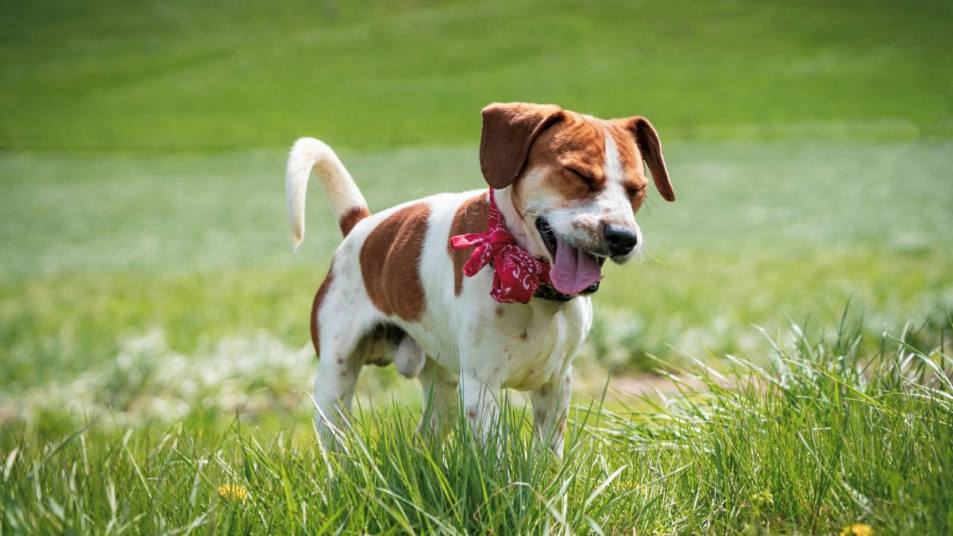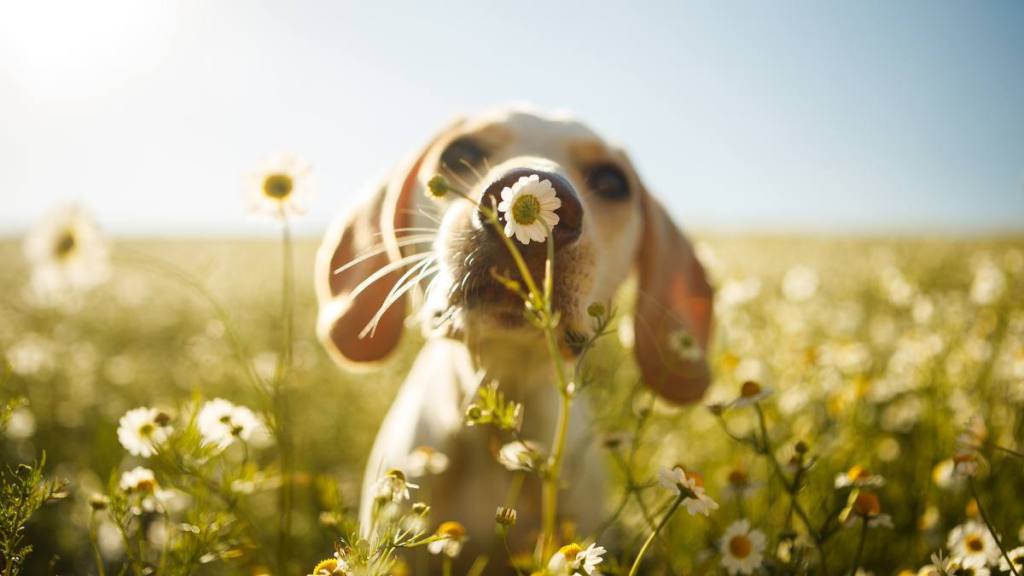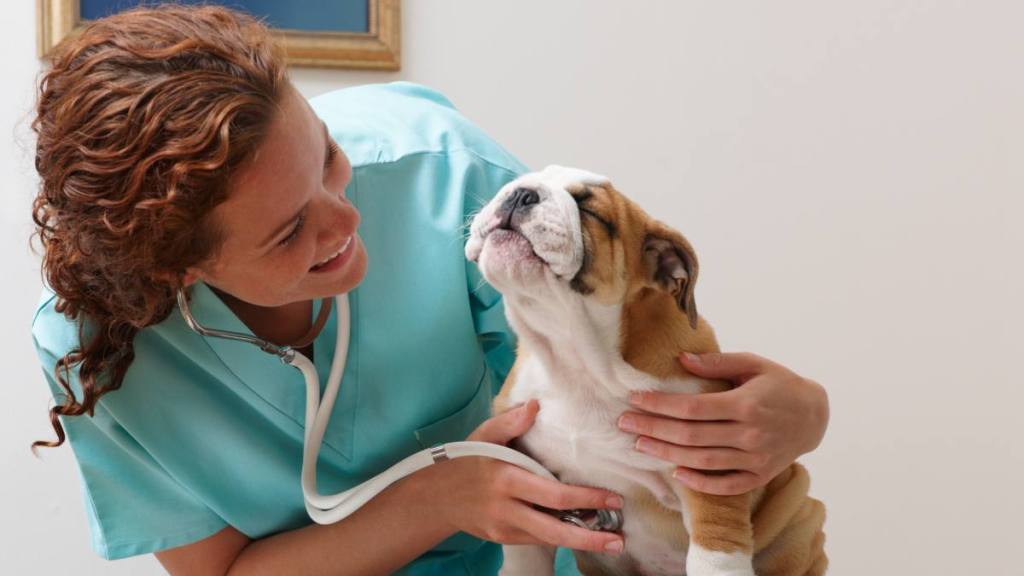Why Is My Dog Sneezing So Much? Vet Shares the Top Causes + When to Be Concerned
It might just be spring allergies!

Ach-oo! Whether you think it’s adorable or the sound of it suddenly startles you from across the room, if Rover starts sneezing in succession, it might lead you to wonder, “Why is my dog sneezing so much?” As it turns out, sneezing in pets is pretty common and, in many cases, can be completely normal. In fact, most of the time dogs sneeze for the same reasons humans sneeze — something is tickling their nose. The tricky part? Trying to determine what the irritant can be. So we checked in with Michelle Clancy, DVM, Veterinary Success Advisor and practicing veterinarian at Indevets.com, who delved into all the reasons your buddy might be sneezing. Keep scrolling to learn more.
Why is my dog sneezing so much?
1. He’s communicating with you
One of the most fun answers to the question of “Why is my dog sneezing so much?” is that he’s likely trying to tell you something! In some cases, sneezing might simply be a normal part of the way your pup chooses to communicate. That’s right — your bestie might be sneezing as a way to relay something to you or his fellow furry playmates. You might notice your cutie sneezes when he gets excited, like when you walk in the door or pick up his leash for a walk, when playing or even when showing submission to other dogs. If so, there’s not much cause for concern and nothing to worry about.
Related: Can Dogs Understand Human Language? What the Science Says About “Dognition”
2. Something is irritating him
Another common reason dogs may sneeze a lot is when tiny bits of physical materials — like dirt, dust or grass — get into their noses when they’re sniffing outside. “If this is the case, typically the sneezing will only last for a short amount of time,” says Dr. Clancy. “If your dog has only sneezed a handful of times but is otherwise acting normal, the sneezing will most likely resolve on its own.” Wait a few days and observe your buddy to see if he starts showing any other concerning behaviors such as decreased appetite, mopiness, a bloody nose, etc. If he doesn’t, he’s probably just been trying to clear any irritants that were tickling his nasal passageways.
Related: Vets Reveal the Best Foods to Calm Your Dog’s Upset Stomach So They Feel Better Fast
3. He may have allergies

Seasonal allergies are yet another pretty common cause of sneezing in dogs. “If your dog sneezes most often after they’ve been outside or when a window is open in your home, then seasonal allergies are probably the cause of the issue,” says Dr. Clancy. “Your dog may need allergy medication for the times of the year when pollen counts are high — and thankfully there are some safe over-the-counter medications you can use.” That said, Dr. Clancy urges owners to be sure to consult with a veterinarian first as many over-the-counter medications may have ingredients that are toxic — and even deadly — for animals. She also adds that for more severe cases, there are prescription anti-itch medications and prescription diets or supplements to help with allergies.
If it is indeed allergies that are causing your pal to sneeze so much, there are a few other actions besides administering allergy medication that you can take to help him feel better. “Bathing and/or wiping down his paws will help if the allergy is due to environmental causes,” says Dr. Clancy. If possible, laundering his bed can be helpful in cases of dust or storage mite allergies.
“Concern for allergies is one of the most common reasons pet owners bring their dogs to the vet,” says Dr. Clancy. She points out that some breeds, such as Labrador and Golden Retrievers, are some of the most likely to develop allergies. “Often allergies in dogs manifest differently than allergies in humans,” she explains. “Allergies in dogs are more closely related to eczema in humans.” What’s more, it might not just be pollen, but other environmental allergens that can also cause irritation and inflammation of the nasal passages.
Related: Yes, Dog Allergies Exist — But They Can Be Hard to Spot
Is your dog also excessively licking or rubbing himself?
Of course, some of these environmental allergens can be pollen outside, but they might also be dust mites inside, fleas, adverse reactions to food or an overactive immune system. Keep in mind that dogs with allergies will usually exhibit other signs before sneezing occurs. “One of the most common clues that your dog may have allergies is if they are exhibiting behaviors such as licking, itching or rubbing parts of their body such as their face, paws or back,” says Dr. Clancy. “In addition to licking, your pet may also have either patches of hair loss and red skin or both.”
Is your dog scratching at his ears?
Another surprising symptom commonly associated with allergies are ear infections since the ears are an extension of the skin. “Sometimes ear infections are the only sign your pet may show,” says Dr. Clancy. “If your pal is constantly scratching at his ear, it might be time for a visit to the vet.” The doctor will take a thorough history to try to determine what may be triggering your pet’s allergies. Most of the time, allergies are diagnosed based on symptoms and history, but you can also request allergy testing, either via a blood test or a skin test just like in humans.
4. He could have an infection
Infections, whether viral, bacterial or fungal, are also common causes of sneezing. “Typically, infections are accompanied by nasal discharge,” says Dr. Clancy. “The sneezing and mucus may last for a few days.” A visit to the vet will help sort out what sort of care your pal might require to get better. In the meantime, if he’s congested, you can also put your buddy in the bathroom and turn on a hot shower — the steam will help ease congestion so he feels better.
5. There may be a blockage

If your pet is sneezing constantly and can’t stop, or is having difficulty breathing, this is cause for a more urgent trip to the veterinarian. “In some cases, physical material can become lodged within the nose and require surgical removal,” says Dr. Clancy. “For example, grass awns — those thin, spiky, barbed extensions of an ear of grass, which are designed to latch on to what’s nearby in order to spread seeds — are common culprits.” Your vet will be able to remove these blockages, and an antibiotic may be prescribed. Never try to remove them yourself, Dr. Clancy cautions, since bits may break off and lodge inside our pal’s nasal passage, leading to more serious complications like migration to other organs and infections.
6. He may have a tumor
It’s rare, but a tumor or polyp can cause sneezing. “These growths may require advanced testing with your veterinary team to determine if this is the case,” says Dr. Clancy. Besides sneezing, other signs of a tumor are noisy breathing, a pus-like discharge that might be streaked with blood, loss of appetite and lethargy. If your pal shows any of these signs make an appointment with a vet as soon as possible.
For more answers to dog-related questions, click through the links below!
Why Does My Dog Stare at Me? Veterinarian Explains What They’re Trying to Tell You
Dog Poop on the Carpet? These Easy Pro Tricks Will Get It Deep-Down Clean Fast
Surprising Causes of Your Dog’s Bad Breath + Vet-Approved Ways to Get Rid of It Fast













